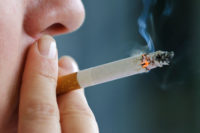Ten years after the Surgeon General’s report on the dangers of exposure to secondhand tobacco smoke, no states in the Southeast have a statewide comprehensive smoke-free law, according to data from the Centers for Disease Control and Prevention (CDC) published in its Morbidity and Mortality Weekly Report (MMWR). A comprehensive smoke-free law is one prohibiting smoking in all private worksites, restaurants and bars.
The number of states (including the District of Columbia) with comprehensive smoke-free laws increased from none in 2000 to 28 by June 9, 2016. Despite this progress, only two states (North Dakota and California) have achieved comprehensive smoke-free status since 2010. With California’s removal of exemptions in their smoke-free law on June 9, nearly 60 percent of Americans are now covered by comprehensive smoke-free laws at the state or local level, up from less than three percent in 2000.
8 states prohibit local smoke-free laws
In 14 of the 23 states with no comprehensive statewide smoke-free laws, local laws protect some residents. However, nine states lack any local or state comprehensive smoke-free law, including eight that prevent localities from passing smoke-free laws. Local protections vary widely. Local smoke-free laws protect 60 percent of West Virginians and more than 30 percent of Texans, South Carolinians, and Kentuckians. However, local laws protect only 2.4 percent of Georgians and less than 1 percent of people in Arkansas and Wyoming.
“Ten years ago, the Surgeon General concluded there is no risk-free level of secondhand smoke exposure,” said CDC Director Tom Frieden, M.D., M.P.H. “We’ve made great progress in protecting many Americans from secondhand smoke exposure, but millions of Americans, especially those living in southeastern states, are still unprotected from this completely preventable health hazard.”
Secondhand smoke's effects
Exposure to secondhand smoke causes heart disease and lung cancer, which together kill more than 41,000 American non-smokers every year. And even brief exposure to secondhand smoke harms health. Completely eliminating indoor smoking is the only way to fully protect non-smokers. Separating smokers from nonsmokers, cleaning the air, and ventilating buildings cannot eliminate secondhand smoke exposure.
“Smoke-free laws provide a low-cost, high-impact benefit to the public’s health,” said Corinne Graffunder, Dr.P.H., director of CDC’s Office on Smoking and Health. “These laws substantially improve indoor air quality, help smokers quit, prevent youth and young adults from starting to smoke, change social norms about the acceptability of smoking, and reduce heart attack and asthma hospitalizations among non-smokers.”
Some states include e-cigarettes
Smoke-free laws can be extended to other types of tobacco products, such as e-cigarettes. Including e-cigarettes in state and local smoke-free laws protects non-users from exposure to aerosolized nicotine and other harmful components of e-cigarette vapor. Currently, seven states (California, Delaware, Hawaii, New Jersey, North Dakota, Oregon, and Utah) include e-cigarettes in their statewide comprehensive smoke-free laws.
Data on secondhand smoke exposure and smoke-free laws are available in CDC's State Tobacco Activities Tracking and Evaluation System at http://www.cdc.gov/statesystem/.
Smokers can call 1-800-QUIT-NOW (1-800-784-8669) or visit http://www.smokefree.gov for help to quit.


